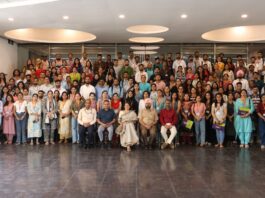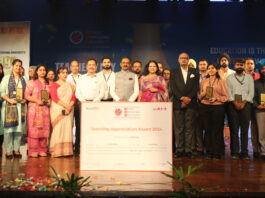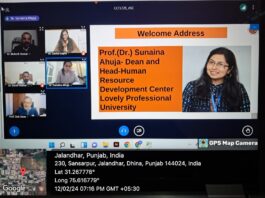A team of LPU researchers has bagged a patent from Indian Patent Office for coming up with a novel and eco-friendly process to desalinate sea water using waste food. The process has been successfully lab tested and found to be 75-80% efficient, making the sea water fit for regular household chores like – mopping, washing clothes and dishes, bathing and even irrigation. The research was conducted by Dr Tanay Pramanik and Dr Runjhun Tandon, Professors at Lovely Professional University, and Mandeep Singh and Stanzin Lzaod, B.Sc. students of LPU.
According to the United Nations’ FAO, by 2025, 1.9 billion people will live in countries or regions with absolute water scarcity, and two-thirds of the world population could be under stress of shortages. A recent survey conducted by the World Wildlife Fund (WWF) has revealed that 30 cities located in India might face acute water risks by 2050. The sea water comprises 96 percent of the water available on the planet but due to oversaturation of salt it cannot be used for household chores and irrigation. The research can help solve this challenge by making sea water usable for household needs.
The existing methods of desalination generate enormous amount of harmful chemical waste whereas this new process invented by LPU researchers uses starch from corn, rice or any other food item and generates ‘zero waste’. The university is now looking for commercialization of the process and once used by an industry player at large scale, it would cost just Rs.2/- to desalinate one liter of sea water.
Dr Tanay Pramanik said, “Shortage of potable water is a major concern for nations across the globe and desalination of the widely available sea water can be a simple solution to this problem. While there are a few methods invented by researchers in the past to desalinate sea water, they create a lot of chemical waste, leading to excessive water pollution. We are proud that our process is completely eco-friendly, generates zero chemical waste and is extremely economical. We are working to improve this process and make the sea water even more cleaner and fit for drinking. This is our ultimate goal for this research.”
Mr. Ashok Mittal, Chancellor LPU said “From the very beginning, at LPU our focus has been on practical learning and applying knowledge to solve real problems. It gives me immense pleasure to see our researchers leaving no stone unturned to invent solutions that address today’s burning issues. I am sure the success of our researchers will make other students at LPU think big and follow the footsteps of these curious minds.”




